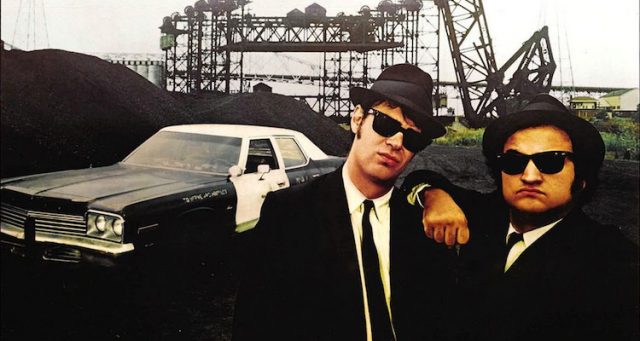
If Jake and Elwood Blues taught us anything — and I think you’ll agree they taught us many things — it’s that you can be religiously devout and still have a good time.
Now, “The Blues Brothers” is not a religious tract, and the Blues Brothers are not exactly saints. The film does have a slight smirk to it. But it’s also an exuberant and joyful movie in which the protagonists earnestly strive to do something selfless and good. They say they’re “on a mission from God,” and they truly believe it. They wear dark suits and ties, they always travel as a pair, and they don’t have time for women. Put them on bicycles and they could be Mormon missionaries.
John Belushi gets first billing in the movie, and it’s his character, ex-con Jake “Joliet” Blues, who has the religious epiphany that drives the action. We’re first introduced to him when he’s released from prison, emerging as if from a tomb, bathed in an ethereal glow of light. I don’t want to make too much of it — I suspect the main idea was to present the very popular John Belushi in an exaggeratedly portentous fashion — but I can’t be the only one who thinks of Easter here.
Having been picked up by his brother, Elwood (Dan Aykroyd), Jake’s first stop is to visit the Catholic orphanage where the brothers grew up. They have to see “the penguin,” as they call the head nun, Sister Mary Stigmata (Kathleen Freeman). They’re irreverent, yes, and more than a little clueless when they keep taking the Lord’s name in vain and can’t seem to figure out how this correlates with Sister Stigmata beating them with a ruler. Yet while the Blues brothers are what you’d call “lapsed Catholics,” they retain a certain respect for the traditions of their youth, and they are devastated to learn the orphanage will be shut down unless the nuns can come up with $5,000 in property taxes.
Sister Stigmata doesn’t want them to get the money in their usual fashion, i.e., by stealing it. In fact, she doesn’t want them there at all. “Get out!” she bellows. “And don’t come back until you’ve redeemed yourselves!” This is accompanied by the ominous sound of blowing winds, and the nun floats backwards into her office. The film is making a joke out of the fact that a character has so clearly stated the theme of the movie, and at the same time driving home that theme. Jake and Elwood must find redemption for their sins. And how can they do that? Perhaps some good deeds will help, as taught by Peter in the New Testament: “Above all have fervent charity among yourselves: for charity shall cover the multitude of sins” (1 Peter 4:8).
The Blues brothers are admonished by Curtis (Cab Calloway), the orphanage caretaker who taught them music, to go to church — not a Catholic church, as it turns out, but an evangelical one, led by a dynamic preacher played by James Brown. It is here, during a frenzied gospel number, that Jake sees a heavenly light and realizes they can raise the $5,000 by getting their band back together and doing a show. He shares his revelation with Elwood, who is likewise converted. They dance for joy, exhilarated to have felt God’s inspiration and to have a clear path outlined for their salvation. They have been born again, converted by — what else? — music.
There’s a deep logic to all this. The kind of music Jake and Elwood play is rhythm and blues, tinged with rock. Rock ‘n’ roll had its origins in rhythm and blues anyway; R&B was pioneered by black musicians (including Cab Calloway) in the first half of the 20th century; and R&B was descended from the folk songs sung by slaves as they worked in the fields. Many of those songs were spiritual in nature, with significant religious symbolism, often drawing parallels between the black slaves in America and the Hebrew slaves in ancient Egypt: “Swing Low, Sweet Chariot,” “Go Down Moses,” etc. In other words, the Blues brothers’ musical roots are religious. It makes perfect sense that they’d be converted at a black church during an energetic choir performance.
From here on they are single-minded in their devotion to the cause. Pursued by police, Elwood says, “They’re not gonna catch us. We’re on a mission from God!” But does Elwood sit back and wait for God save them? No indeed. He drives like a maniac through a shopping mall and successfully evades capture. As the apostle James said, “Faith without works is dead” (James 2:20). Even people on missions from God have to put forth their best effort.
The brothers work tirelessly to reunite the band and raise the $5,000. Failure is not an option. Note that while they believe God inspired them, at no point do they ask for his help. They seem to accept that performing this mission might endanger them. When they’re ultimately successful at doing what they set out to do and are thrown in prison for all the laws they broke in the process, they don’t get angry at God for failing to look out for them. They take it in stride. Jesus warned his disciples that they’d be persecuted while on his errand. The early apostles and other Christians were in and out of prison constantly, and that’s when they weren’t being fed to lions. Why should the Blues brothers be any different?
So in a way, Jake and Elwood are religious martyrs. They risk their lives and freedom to do what God asked of them — and not just to save their own souls, but out of a sincere desire to help the orphanage. Like the early apostles, they occasionally “preach” to an unreceptive audience. They make a lot of people angry, including the police, a country-and-western band, Illinois Nazis, and Carrie Fisher. But they never give up.
Would God approve of all their actions? Not according to most theologies, no. You tread on dangerous ground if you start to say that you’re justified in doing ANYTHING if it’s in God’s name. But Jake and Elwood have their hearts in the right place and earnestly strive to do good. Most religions would say that’s the most important thing anyway.
— Cinematical



